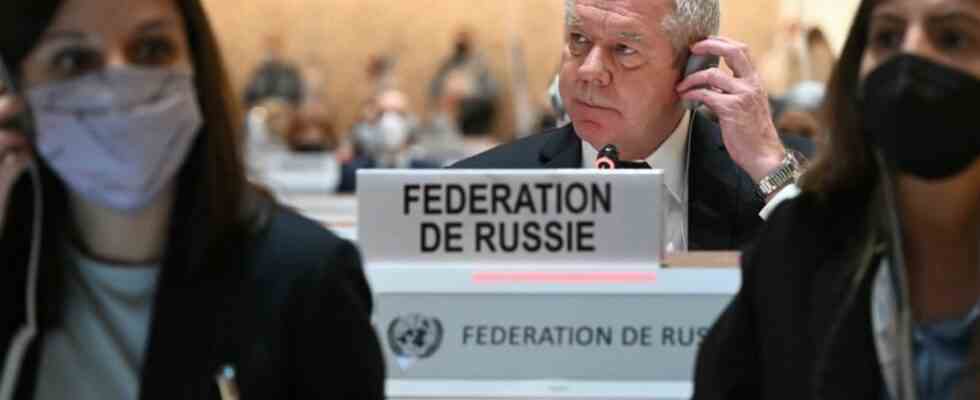Special Rapporteur
UN Human Rights Council investigates situation in Russia
Russian Ambassador to the UN Gennady Gatilov at a meeting of the UN Human Rights Council in Geneva in February shortly after the Russian attack began. photo
© Fabrice Coffrini/KEYSTONE/dpa
The human rights situation in Russia is being examined by a UN special rapporteur. A corresponding resolution was successful in Geneva – despite dissenting votes.
The UN Human Rights Council examines the human rights situation in Russia. On Friday in Geneva, he decided to appoint a special rapporteur. 17 countries voted in favor of the resolution, including Germany, six against and 24 abstained.
“This step was long overdue,” said German Ambassador Katharina Stasch. “Russia has been trampling on human rights at home for a long time.” Victims of human rights violations, non-governmental organizations and the opposition finally have a voice again.
The 25 Western countries that introduced the resolution had failed the day before with an application on China.
In the text of the resolution, they express great concern, among other things, about restrictions on freedom of expression and assembly, intimidation of journalists, lawyers and opposition forces, extrajudicial killings of government critics, arbitrary arrests, pressure on civil society organizations and the lack of fair trials. They called on Russia to guarantee people’s basic rights, including freedom of expression.
Russia’s allies disagree
The special rapporteur, who has yet to be appointed, is to examine the situation, report to the UN Human Rights Council in a year’s time and make recommendations on how the situation can be improved.
Bolivia, China, Eritrea, Kazakhstan, Cuba and Venezuela voted against the resolution. Russia is currently not a member of the council of 47 countries elected for three-year terms by the UN General Assembly. However, the Russian ambassador was present and condemned the resolution as political haggling. Rather, racism and police violence in the countries that introduced the resolution should be investigated. China rejected the text as interference in internal affairs.
At the lecture, an attempt to organize a debate on the report by the UN High Commissioner on the situation in the Chinese region of Xinjiang failed. The late August report cited evidence of crimes against humanity as a result of the repression of Uyghurs and other minorities. But when voting to hold a debate, 18 countries sided with China. The resolution failed with 19 no to 17 yes votes.

